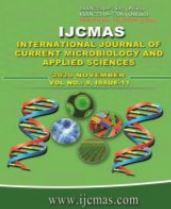


 National Academy of Agricultural Sciences (NAAS)
National Academy of Agricultural Sciences (NAAS)

|
PRINT ISSN : 2319-7692
Online ISSN : 2319-7706 Issues : 12 per year Publisher : Excellent Publishers Email : editorijcmas@gmail.com / submit@ijcmas.com Editor-in-chief: Dr.M.Prakash Index Copernicus ICV 2018: 95.39 NAAS RATING 2020: 5.38 |
Ripening is the final stage in the life cycle of a fruit and it is an irreversible process. During ripening, fruits undergo various physiological and biochemical changes. These changes includes conversion of sugar from one form to another, textural changes, colour changes, change in aroma and flavor. Banana is one of the most easily available climacteric fruit which is distributed throughout the world. Since it is a climacteric fruit, its commercial ripening can be carried out in storage houses to obtain good flavor, proper texture and uniform peel colour. Ethylene glycol, ethrel and ethephon are some of the most widely used and easily available ripening agents in the market. Banana fruits were treated with different concentrations of each of the above mentioned ripening agents. Different parameters like flavour, colour and time taken for ripening were studied and the results indicated that the treated fruits were more uniformly ripened than the untreated fruits. The treated fruits took less time to ripen than the untreated fruits. This artificial method of ripening can be useful for small scale farmers and traders as it assures good quality and takes less time for ripening.
 |
 |
 |
 |
 |